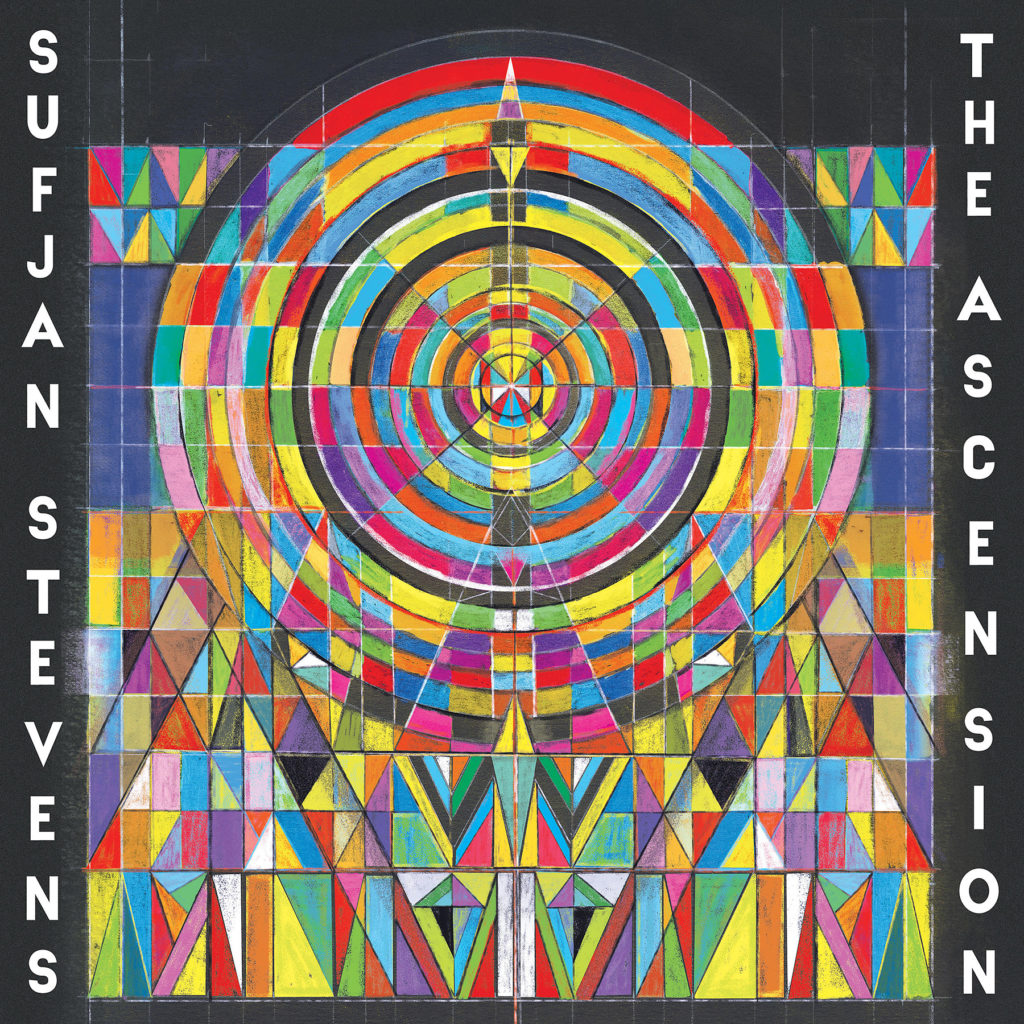The Ascension, the latest album from Sufjan Stevens, abrasively discusses America’s failures through a kaleidoscope of synthesisers, drum machines, and proclamations.
After three minutes of listening to Sufjan Stevens’ eighth studio album for the first time, I was forced to stop and pause from the sonic explosions pulsing through my ears. Standing up from my desk, instead, I let the needle drop onto his previous project, Carrie & Lowell. You’ve likely cried to this album or know a lonely city dweller that has. That’s because 2015’s Carrie & Lowell is an indie-folk dream: a gentle, story-focused, cathartic experience.
I returned to its vignettes, seeking its familiar comfort. Why? Well, The Ascension sounded like everything Carrie & Lowell wasn’t. Sweeping proclamations instead of subtle observations. Loud electronica replacing soft, folk instrumentation. Outward-looking opinions over inward-looking revelations.
Though The Ascension initially surprised me, Stevens is no stranger to ambitious projects: remember his 50 albums for each U.S. state idea? He’s also previously experimented with electro-pop on his melodramatic 2010 album, The Age of Adz. So, why did I really turn back to Carrie & Lowell? Because I feared that Stevens had passed his musical zenith. However, maybe that’s exactly where its power lies: The Ascension is an entirely relevant record for our times.

Released via Asthmatic Kitty Records, The Ascension is 120 minutes of unfiltered opinion on the state of the world. “I had been holding back a lot of resentment towards pop culture and American culture,” Stevens admitted to The Atlantic. With over 20 years in the music game, it’s more than reasonable for him to try his hand at a kind of outward pessimism instead of remaining in the realm of the personal.
“Make me an offer I cannot refuse!” Stevens belts on the album’s opening track, a desperate plea for a radical change to America’s current values, backed by intricate layers of electronic drums and synthesisers. The result is limitless. His weighted request is amplified by a discomforting scale continuing upwards, like an electronic rendition of The Beatles‘ crescendoed cataclysm in A Day In The Life.
After some much-needed breathing space, the listener is transported to one of the album’s highlights: the spacey, dreamy Run Away With Me. Its ethereal falsetto harmonies in the chorus are a soothing antidote to the emancipated criticisms and cynicism found in the majority of the tracklist.
Video Game, the record’s second single, follows a crisp, mid-tempo demonstration of “editorial pop” – the album’s self-described genre. Its hook is infectious and catchy, but there’s an intriguing complexity that lurks beneath. Video Game explores the difference between vain, attention-seeking behaviour and genuine self-expression, accompanied by a music video featuring TikTok star Jalaiah Harmon. Stevens beckons his audience to do the same. He wants us to be our “own redeemer” and not submit to the resume-building fakery that society rewards. “I don’t wanna be a puppet in a theatre. I don’t wanna play your video game,” he sings.
Though enchanting in its minimalism, eerie keys and vocal echoes all beckon to a moment of unfulfilled potential in the record. “I wanna die happy,” Stevens sings into a sparse electronic landscape countless times. The evolving instrumentation throughout is a masterclass in ambience and pacing, but the potential of this track suffers due to the overestimated strength of a single line.
Ativan is one of the more intimidating tracks on The Ascension, which is saying something. This is hardly a criticism though, as Stevens’ fine-tuned narrative genius recounts a panic-attack with compelling effect. The sporadic synth/drum breakdowns inject anxiety directly through the listener, bringing awareness to mental health in a way that doesn’t feel lectured. The vivid lyrics also paint a fitting picture of advice, textured perfectly against the album’s cover art: “separate the colours from the black.”

Ursa Major is right on the money, theme-wise. The hook, “I wanna love you”, is sung with such anguish that it casts America as barely redeemable, a mere facade of its former glory. The mesh of distorted vocals evokes a surreal soundscape, which is enhanced by the highly experimental blend of cartoonish sound effects, percussion, and drum machines.
The Ascension’s moody third single, Sugar, is another hypnotic slice of indie-electronic pop. Melancholy spreads across the track’s loops and glitches, as you wait in anticipation for a drop of some kind. Like a blank mind, seven minutes pass and nothing changes. The syrupy line “come on baby give me some sugar”, is something that I never, ever expected an indie-folk royal to proclaim, not even sarcastically.
The record concludes with America, an impressionistic composition addressing the USA. “I’m ashamed to admit I no longer believe”, is probably the harshest statement in The Ascension’s 120-minute runtime. It’s the album’s standout, complete with some signature Sufjan tells: biblical references, stunning falsetto, honesty, unexpected chords, and carefully layered instrumentation.
It’s no secret that Stevens has severely changed his tone in The Ascension. This is a bitter record, icy and stark, with limited glimpses of redemption for the listener. The shifting tides of America’s priorities have stung the artist, forcing an outward commentary. It’s refreshing and entirely brilliant but doesn’t come close to the shattering insights that Stevens reveals when he turns inward. Carrie & Lowell may well have been Stevens’ peak, but The Ascension is what the world needs to hear right now.
The Ascension is out tomorrow, September 25. Pre-order your copy here.



